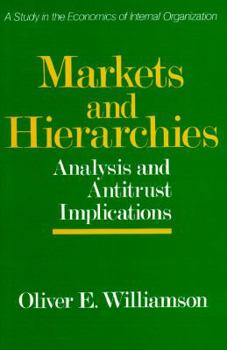Markets and Hierarchies: A Study in the Internal Organizations
Select Format
Select Condition 
Book Overview
Markets And Hierarchies : Analysis And Antitrust Implications This description may be from another edition of this product.
Format:Paperback
Language:English
ISBN:0029347807
ISBN13:9780029347805
Release Date:January 1983
Publisher:Free Press
Length:286 Pages
Weight:1.00 lbs.
Dimensions:9.3" x 0.9" x 6.1"
Related Subjects
Business Business & Investing Economic Theory Economics Law Popular Economics TheoryCustomer Reviews
2 ratings
Markets and Hierarchies by Oliver Williamson
Published by Thriftbooks.com User , 25 years ago
Markets and Hierarchies is considered a most influential contribution to the institutional economics approach in the strategy literature. Introducing a transaction-cost dimension, it bridges economics and organization theory. Hence, both economists and researchers from the fields of social sciences can find this book appealing. Williamson begins by claiming that conventional economic analysis makes unnecessary assumptions and is too abstract to capture the characteristics of economic exchange and its effect on the transaction consummation mechanism, namely the preference of intrafirm versus interfirm trade. Then he introduces concepts of bounded rationality and opportunism to expand the discussion of organizational forms. He suggests the transaction as the appropriate unit of analysis to evaluate hierarchies and markets. The main argument in the book is presented in the Organizational Failures Framework (OFF), which is designed to specify which mode will be relatively efficient in formulating and executing contracts based on a combination of environmental and human factors. The OFF offers two combinations, a derived condition and a general system effect to explain organizational failures: (1) Bounded Rationality and Uncertainty/Complexity - Faced with conditions of uncertainty and complexity, where the decision tree is not clear, bounded rationality poses information processing and communication problems. A hierarchy would be preferred to a market in this case because internal organization can economize on bounded rationality. (2) Opportunism and Small Numbers - Williamson extends the self-interest assumption in microeconomics to suggest opportunistic behavior. Under such conditions, participants in transactions are expected to reveal partial or distorted information and provide self-disbelieved promises. A small numbers situation at the outset or renewal of a contract induces the risks of opportunistic behavior, which cannot be detected ex ante. Here again, hierarchies would be preferred to markets because in internal organization it is harder to appropriate gains from opportunistic behavior, and because monitoring and conflict resolution mechanisms are more effective. (3) Information Impactedness (asymmetric information) - Under conditions of opportunism and uncertainty, one party can find it costly to achieve information equality. Hierarchies will be preferred to markets because they reduce opportunistic tendencie encourage information sharing and effective communication. (4) Atmosphere - OFF assigns value not only to the outcomes of the transaction but also to the economic exchange process. Internal organization provides more encouraging atmosphere in terms of the development of reciprocal social relationships. Williamson offers several applications to illustrate his arguments and discuss antitrust implications. The replacement of markets by nonmarket alternatives first considers cooperative peer groups.
great
Published by Thriftbooks.com User , 26 years ago
Posting Customer Reviews is a two-step process. First, complete the form below and click "Preview your Review." Then, we will show you how your comments will appear online. When you're ready to submit them, click the "Submit your Review" button on the bottom of the page.






